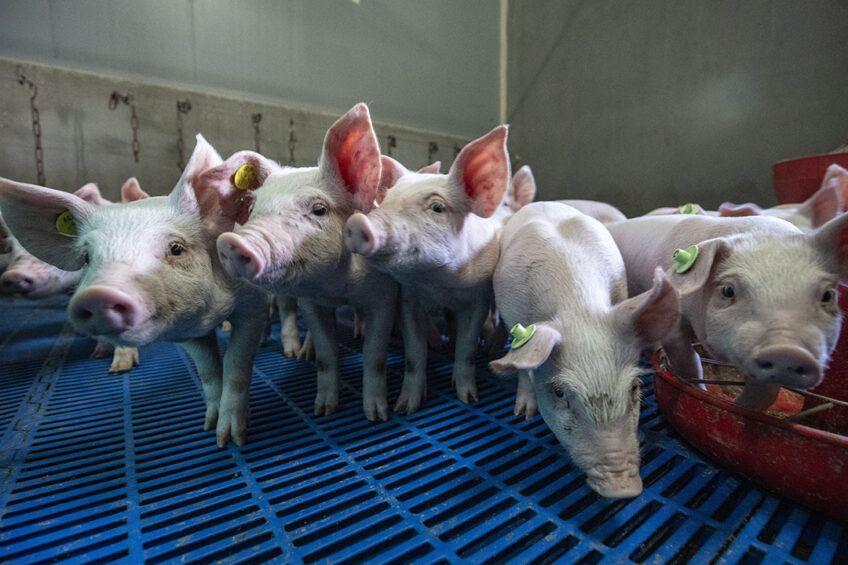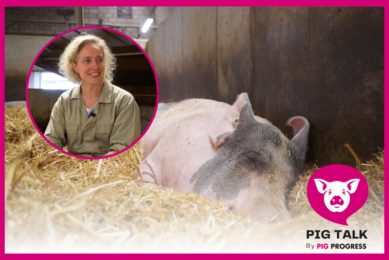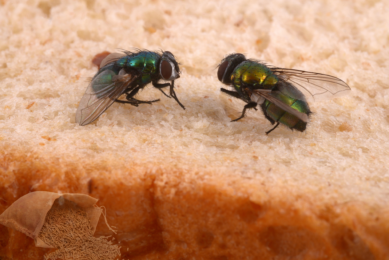Combined effects of probiotics and insect meal on pig health

Following this study published in Veterinary Research (2023), the bioactive properties of black soldier fly larva full-fat meal combined with multi-strain probiotics have been identified as effective additives that improve pig gut health and performance to a level similar to that of in-feed antibiotics.
Multi-strain probiotics are well established as having more antibacterial, anti-inflammatory, and antioxidant properties than single-strain probiotics, while black soldier fly larva is an attractive protein source for monogastric animals, owing to its high crude protein content and fatty acids such as lauric acid. BSFL-derived antimicrobial peptides (AMPs) and chitin are known to inhibit the proliferation of harmful bacteria and activate the immune system. However, few studies have examined how a combination of black soldier fly larva (BSFL) and multi-strain probiotics compare to the use of antibiotics in weaned pigs.
The study
In this study, researchers evaluated the effects of dietary supplementation of full-fat black soldier fly larvae (BSFL) alone or in combination with multi-probiotics in comparison to dietary antibiotics in weaning piglets. The effects were assessed in terms of growth performance, nutrient digestibility, immune status, antioxidant status, intestinal integrity and microbial modulation.
Piglets were allotted to 4 diet groups:
Positive control (PC): diet supplemented with 0.02% amoxicillin
Negative control (NC): diet without the addition of supplements
BSFL: Negative control diet + 12% BSFL full-fat meal
BSFL + probiotics: BSFL full-fat meal + 0.1% multi-probiotics (Bacillus subtilis, B. licheniformis, and Saccharomyces cerevisiae).
Growth performance, diarrhoea and nutrient digestibility
The combination of fat black soldier fly larvae and probiotics led to the best improvements in the growth performance, feed efficiency and health status of piglets (low rate of diarrhoea). The improvements in performance were attributed to the unique properties of the diet not only providing an excellent source of protein, essential amino acids, and energy but also providing several active compounds. As observed in other studies, the chitin content of insects triggers the secretion of growth hormone and insulin-like growth factor 1, leading to higher body weight gain in weaning pigs. Growth promotion was also associated with the action of BSFL-derived antimicrobial peptides (AMPs) that help enhance health status. In the same line, previous studies show that addition of Bacillus spp. helps promote the digestion of soluble or insoluble fractions of feed, increasing the absorbability of nutrients by enterocytes and maintaining the health status of pigs during the post-weaning period. Researchers also observed an increase in the relative weight of the spleen after 4 weeks of feeding with the BSFL + Probiotics diet, implying an improved immune system that contributes to the overall improvement in growth performance.
Both the BSFL-alone and the BSFL + probiotics groups delivered higher protein and fat digestibility. BSFL full-fat meal has a high protein content and is a good source of amino acids, which can further improve CP digestibility as was observed. On the other hand, the high-fat content and degree of saturation of fatty acids may be a major reason for the improved digestibility of fat in BSFL-supplemented diets over the negative control diet. In this study, lauric acid (C12:0), which is rapidly utilised and passively absorbed by the animals, was the main component of saturated fatty acids in the BSFL diet. Combined with microbial lipase secretion from Bacillus-based probiotics, C12:0 may have broad effects in the hydrolysed 1 and 3 positions of dietary triglycerides. The BSFL + probiotics combination led to improved nutrient digestibility compared to the PC diet, suggesting greater availability of nutrients beyond the antibiotic treatment (Table 1).
Blood-related gut health and antioxidant status
The results showed that serum IgA and IgG concentrations increased in pigs fed either the BSFL or the BSFL + probiotics diet, confirming improvements in the immune status of piglets. Previous studies show that the higher C12:0 content of BSFL-supplemented diets may activate interleukin production, which in turn promotes the production of immunoglobulins. The researchers also suggested the possibility that the binding site of Bacillus-based probiotics can bind with IgG Fc-receptors as additional ligands, which can subsequently influence immunoglobulin secretion.
On the other hand, pro-inflammatory cytokines (such as IL1β, IL6, and TNFα) are known to be secreted as part of the innate immune response; these factors have detrimental effects on intestinal mucosal injury and dysfunction, impairing nutrient digestion and absorption. In this study, these detrimental factors were downregulated in the BSFL and BSFL-probiotics diet.
An increase in the antioxidant enzyme activity of enzymes superoxide dismutase (SOD) and glutathione peroxidase (GSH-Px) observed with the supplementation of BSFL and the probiotics is an indication of an improved antioxidant defence system; the total antioxidant capacity (TAC) also increased as the malondialdehyde (MDA) decreased; this was attributed to the high content of phenolic compounds in BSFL.
Microbial modulation
The combination of BSFL+ probiotics produced greater colonisation of Lactobacillus spp. and lower E. coli than both the control diets. The presence of lauric acid in the BSFL-supplemented diet is beneficial for the intestinal microbiota of weaning pigs, as it facilitates the semi-permeable membrane of pathogenic microbes and improves the intestinal structure of piglets. Chitin is a major fibrous compound in arthropod exoskeletons which is strongly attached to β-glucan in the chitin-glucan complex, which is selectively used as a fibrous substrate by host microorganisms for growth. This promotes the adherence of beneficial microbiota (such as Lactobacillus spp.) while reducing the faecal E. coli count in the hindgut. Bacillus-based probiotics are considered facultative anaerobes with high resistance to acidic conditions (low pH as observed in this study) allowing them to attach to the gut surface and produce various bacteriolytic proteins.
Intestinal integrity
The results of this study indicated that dietary BSFL and BSFL + probiotics increased duodenal villus height, which is indicative of improved gut health in pigs. A longer villus height increases the mucosal surface area, facilitating improved digestion and absorption of available nutrients. As observed in other studies, this may be because BSFL-supplemented diets promote the activity of digestive enzymes (including membrane-bound peptidases) and facilitate more efficient utilisation of CP, amino acids, and fat. Chitin derivatives are also reported to enhance enterocyte proliferation and diminish villous atrophy.
It was concluded that dietary supplementation with BSFL or BSFL + multi-probiotics can improve the growth performance and intestinal health of pigs and may be an effective strategy to replace antibiotics for weaned pigs.











